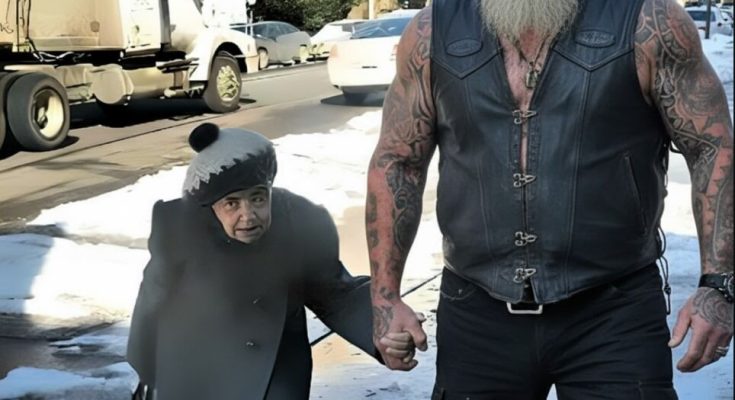Dorothy Mitchell was eighty-seven—frail, proud, and fiercely independent. She lived alone in apartment 4B, the same small place she’d called home for forty-three years. Her husband, George, had passed away in 2003. Her three grown children lived in different states, visiting only on holidays—when they remembered. Parkinson’s had stolen her steady hands, osteoporosis had curved her spine, and loneliness had slowly hollowed out her days.
I live across the hall. I’m a journalist who works from home, and over time, I watched Dorothy’s world quietly shrink. Her home-care nurses changed constantly—new faces every few weeks, each one polite, efficient, and emotionally distant. They fed her, cleaned her, handed her pills, and left. Dorothy always tried to start a conversation, but most were in a hurry. Eventually, she began leaving her door open a crack during the day—just enough to let in the sounds of life beyond her silence. I often waved as I passed, sometimes stopping to chat. She would tell me stories about George, a Korean War veteran, about her travels, and her children who were “too busy living.” Lately, she admitted she couldn’t even fetch her mail alone anymore.
Then one Tuesday in January, everything changed.
That morning, I heard her door open and glanced through my peephole. A huge man stood there—six foot four, heavily tattooed, beard reaching his chest, wearing a leather vest marked with the emblem of a motorcycle club. He was holding grocery bags. My first thought was that Dorothy was being robbed.
I flung open my door. “Can I help you?” I asked sharply.
He turned toward me and smiled—a warm, genuine smile that instantly softened his rough exterior. “Just helping Miss Dorothy with her groceries,” he said.
From inside, I heard Dorothy’s cheerful voice—more alive than I’d heard in months. “Michael, is that you? Come in! And bring my nosy neighbor too!”
Curious and cautious, I stepped inside. Dorothy sat in her recliner, glowing. “This is Michael,” she said proudly. “My new helper. I fired the agency yesterday.”
Michael unpacked the groceries with confidence. “Miss Dorothy likes her crackers on the second shelf,” he said. “And her tea bags go in the tin by the stove.” He moved around her kitchen as if he’d lived there for years.
“You fired the agency?” I asked. “Do your kids know?”
Her smile flickered. “My children don’t need to approve everything I do. I’m old, not dead.”
Michael worked quietly, respectful but at ease. When it was time for her medication, he handed her the pills with a glass of water, his touch gentle, his care sincere. The tenderness in that small act said everything words couldn’t.
I finally asked how they met. Dorothy’s eyes sparkled mischievously. “He tried to steal my purse.”
Michael laughed. “That’s not exactly true.”
She waved a hand. “Close enough. Go on—tell her.”
Michael explained that three weeks earlier, he’d been riding by when he saw Dorothy sitting outside on a bench in the freezing cold. The elevator was broken, and she couldn’t climb the stairs. “She was shivering,” he said, “so I carried her up four flights.”
When they reached her apartment, she tried to hand him her purse as payment. “That’s what I thought he wanted,” she admitted softly. “Everyone wants something.”
But he didn’t take it. “I told her I helped because she needed it,” he said. “She cried. Said nobody had done something for her without expecting anything back in ten years.”
She invited him in for tea, and they talked for two hours—about his motorcycle club, his carpentry work, his daughter, her late husband, her life. “It was real conversation,” Dorothy said. “The kind I hadn’t had since George died.”
The next day, he came back. And the day after that. Within a week, she fired her nurse and asked him to help her instead.
I was skeptical. “But those nurses are trained,” I said.
Dorothy looked at me steadily. “They’re trained to keep me alive. He makes me feel alive.”
Michael added quietly, “I don’t do this for money. She insists on paying me, but I’d come anyway. My grandmother died alone in a nursing home while I was deployed in Afghanistan. I promised myself I’d never let another grandmother die alone if I could help it.”
Over the next few weeks, their bond deepened. Every morning at nine, he arrived—helping her bathe, dress, and make breakfast. They’d sit and talk for hours. When the weather was kind, he lifted her into a wheelchair he’d bought himself and took her for walks—through the park, to her favorite café, to the library.
People stared—a burly biker pushing a fragile old woman—but Dorothy didn’t care. “Let them stare,” she said. “I’ve got the most interesting caretaker in town.”
Soon, Michael began taking her to motorcycle club gatherings—cookouts, charity rides, fundraisers. Dorothy became the club’s honorary grandmother. Thirty tattooed men in leather called her “Miss Dorothy” and competed to bring her desserts. One afternoon she told me, tears in her eyes, “I haven’t felt this alive in twenty years.”
Then her children found out.
Her daughter Sarah called me, furious. “Who is this man? Is he stealing from her? Taking advantage of her?” I told her the truth: Dorothy was happier, healthier, and finally cared for. But Sarah wouldn’t listen. “The Parkinson’s affects her judgment,” she said. “We’ll stop this.”
Two weeks later, all three children arrived together. They stormed into Dorothy’s apartment, shouting accusations of elder abuse.
Dorothy stood—shaking but fierce. “Get out of my house.”
“Mom, we’re trying to protect you,” Sarah said.
“Protect me from what?” Dorothy snapped. “From kindness?”
Her son Robert pointed at Michael. “Look at him! Tattoos, leather—he’s using you.”
Michael stayed silent.
Dorothy crossed the room, took his hand, and said, “This man carried me up four flights of stairs when I was freezing on a bench. He bathes me, feeds me, makes me laugh. When was the last time any of you made me feel like I mattered?”
The room went quiet.
“We’ll petition the court for guardianship,” Sarah said coldly.
“Do it,” Dorothy replied. “Let a judge meet him. Let them see what you can’t—that love and care don’t always look the way you expect.”
The case went to court. I testified, along with three other neighbors. The judge interviewed Dorothy and Michael privately. When the ruling came, it was clear: Dorothy was mentally competent, and her choice of caregiver was “unconventional but wise.” The judge added, “Family isn’t always blood. It’s the people who show up. And Mr. Michael has shown up every single day.”
Dorothy’s children cut off contact after that. It broke her heart, but she wasn’t surprised. “They wanted their inheritance,” she said quietly. “Not me.”
As her health declined, Michael moved in to care for her full-time. His motorcycle club brothers took turns visiting, cooking, cleaning, telling stories, making her laugh. When she fell and broke her hip, he rode in the ambulance, refused to leave her side, and held her hand through every sleepless night.
When doctors recommended a nursing facility, he said firmly, “No. She’s going home. I’ll take care of her.” And he did. He learned wound care, physical therapy, medication management—everything. He slept on a cot beside her bed.
Months passed. Dorothy’s body weakened, but her spirit shone brighter than ever. Her laughter filled the hallway again. Every day, the bikers came by with flowers, food, and laughter.
Last week, she called me over. “Promise me something,” she said, gripping my hand. “When I’m gone, tell people about Michael. Tell them not to judge by appearances. Tell them that family is the people who show up. Because the man my children called dangerous is the reason I’m dying with love instead of loneliness.”
So here I am, keeping that promise.
Dorothy Mitchell is eighty-seven. She’s dying peacefully—not surrounded by her blood relatives, but by a motorcycle club that treats her like royalty. Michael quit his job to care for her full-time. “She gave me purpose,” he says. “Everything else is just noise.”
People often fear what they don’t understand. But Dorothy understood something her children never did—that compassion wears many faces. Sometimes it has tattoos and rides a Harley. And sometimes, the people the world calls dangerous are the ones who show up when everyone else walks away.
Dorothy knew who her real family was. And now, so do I.



